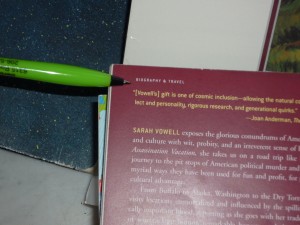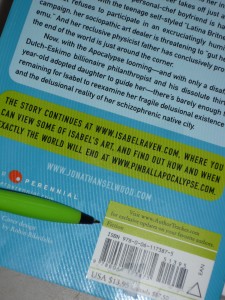
Last time, I took a break from our ongoing series to respond to a readers’ question about how to handle an exclusive request from an agent. Specifically, she wanted to know what she should do if she had already agreed to let one agent sneak an exclusive peek at her manuscript, but another agent had asked afterward to see it non-exclusively. What’s a writer to do?
The short answer: abide by her commitment to Agent #1 for the duration of the agreed-upon period of exclusivity, then move on to Agent #2. The only apparently shorter answer: what honoring that agreement means vis-Ã -vis approaching other agents really depends upon the terms of the exclusivity agreement.
Have I lost those of you who walked in halfway through this discussion? Okay, I’ll recap: an exclusive is an arrangement whereby a writer allows an agent to read a particular manuscript while no other agent will be reviewing it. The agent requests an exclusive because he would prefer not to compete with other agents over the manuscript; the writer agrees, presumably, because if this agent says yes, she will neither need nor want to approach other agents.
Let’s be clear about what that means in practice, campers: the writer guarantees that nobody else will be in the running while the requesting agent is pondering the pages. Anyone see a potential problem with that?
Give yourself a large, shiny gold star and a pat on the back if you instantly asked, “Wait a minute — what happens if the request for an exclusive comes in while another agent is already considering the manuscript?” That would indeed present a problem, because by definition, a writer cannot grant an exclusive if any agent is currently reading any part of the manuscript in question; in order to comply with a request for an exclusive, the writer must wait until all of the agents reading it at the time the exclusivity request arrived have informed him of their decisions.
Doesn’t seem like all that complicated a premise, does it? Yet hardly a month goes by when I some exclusive granter doesn’t tap me on the shoulder (physically or electronically) to ask, “Um, Anne, do you remember that request for an exclusive I was so excited about a week and a half ago?” (Or a month and a half, or six months.) “I’ve heard from another agent. What should I do?”
Which leads me to the other potential problem that I sincerely hope some of you came up with two paragraphs ago: what happens if an agent who asked for an exclusive doesn’t get back to the writer within a reasonable amount of time? Is the writer still bound by the exclusivity agreement? Or is there some point at which it’s safe to assume that silence = thanks, but we’re not interested?
The short answers to each of those last three questions, in order: it depends on the terms of the original agreement; it depends on the terms of the original agreement; it depends on the terms of the original agreement.
What does it depend upon? Those of you who read breathlessly through yesterday’s post, shout it along with me now: it depends upon whether the writer had the foresight to set an end date for the exclusive. If an exclusive is open-ended, the writer cannot ethically send out requested materials to other agents until one of two things happens: the exclusive-requester informs the writer that she has rejected the manuscript, or so many months have passed without word from the agent that it’s safe to assume that the answer is no.
Even then — say, six months — I’d still advise sending an e-mail, asking if the exclusive-seeking agent is finished with the manuscript. It’s only polite.
Or avoid this dilemma entirely by hedging your bets from the get-go: grant the exclusive, but send the manuscript along with a cover letter that mentions how delighted you are to agree to a six-week exclusive. The agent can always come back with a request for more time, but at least you won’t be left wondering six months hence whether you’ll offend her if you move on.
I’m sensing some severe writerly disgruntlement out there. “But Anne!” exclaim aspiring writers who want there to be more options. “Why should I borrow trouble? Surely, you don’t expect me to run the risk of offending an agent by implying that he’s not going to get back to me in a timely manner?”
Hey, I don’t expect anything; do as you think best. I’m just the person that aspiring writers keep asking how to get out of an exclusive that hasn’t panned out as they had hoped.
To help you weigh the relevant risks, let’s look at the phenomenon from the other side of the agreement. Generally speaking, agents will request exclusives for only one of three reasons: they fear that there will be significant competition over who will represent the project, they don’t like to be rushed while reading, or it is simply the agency’s policy not to compete with outside agencies, ever.
Do I feel some of you out there getting tense over that third possibility, doing the math on just how many years (if not decades) it could take to make it through your list of dream agents if you had to submit to them one at a time? Relax, campers: requests for exclusives are actually fairly rare.
Why rare? Well, the first kind of exclusive request I mentioned yesterday, the one Agent A might use to prevent Agents B-R from poaching your talents before A has had a chance to read your manuscript (hey, A’s desk is already chin-deep in paper), tends to be reserved for writers with more than just a good book to offer. Celebrity, for instance, or a major contest win fifteen minutes ago. Basically, the agent is hoping to snap up the hot new writer before anybody else does.
Or before the HNW realizes that s/he might prefer to be able to choose amongst several offers of representation. Since pretty much every respectable agency offers the same service, such choices are often made on the basis of connections, how well-established the agency is, or even how well the writer and the agent happen to hit it off. If an agent fears that the other contenders might be able to offer a rosier prospect, it might well be worth her while to buttonhole the HNW and get her to commit to an exclusive before anyone else can get near.
So if you suddenly find yourself the winner of a well-respected literary contest or on the cover of People, remember this: just because an agent asks for an exclusive does not mean you are under any obligation to grant it.
Oh, pick your chin up off the floor. If your work is in demand, it’s not necessarily in your best interest to sign with the first agent who makes an offer — you will want the one with the best track record of selling books like yours, right? Ideally, you would like to be in a position to compare and contrast offers from different agents.
Why not pick the one who asks first and be done with it? Chant it with me now, long-time readers: you do not want to land just any agent; you want the best agent for your work.
If you shouted, “Yes, by Jove: I want to query and submit in a manner that maximizes the probability to be fielding several offers at once!”, then I suggest you consider two questions very carefully before you decide which agents to approach first:
(1) If an agency has an exclusives-only policy, should it be near the top of my query list, potentially forcing me to stop my submission process cold until they get back to me? Or are there agents who permit simultaneous submissions that I could approach all at once before I queried the exclusive-only agency?
(2) Is there an agent on this list to whom I would be OVERJOYED to grant an exclusive, should he happen to request it after seeing my query or hearing my pitch, or would I be equally happy with any of these agents? If it’s the former, should I approach that agent right off the bat, before sending out queries to any exclusives-only agents on the list?
The disgruntled murmur afresh: “Okay, Anne, I get it; an ounce of prevention is worth a pound of cure. But where does this leave Virginia and the many other writers out there who have granted exclusives to the first agent who asked, only to find themselves chafing under the agreement down the line, when other agents asked to see the manuscript? Can’t you offer then just a few ounces of cure?”
Again, it depends: why did the agent asked for the exclusive in the first place, and how long it has been since the writer granted it?
If the agent asked for it because her agency has an advertised policy that it will only consider exclusive submissions, then the writer is indeed obligated to hold off on further submissions. If the agreed-upon period has elapsed, Virginia can always contact the agent and ask point-blank if s/he needs more time.
What the writer should most emphatically NOT do when dealing with an exclusives-only agency is contact the agent, explain that others want to read the work, and ask if it’s okay to submit simultaneously — which, incidentally, is very frequently the writer’s first impulse, if those who contact me on the sly to ask my advice are any indication. Bless their optimistic little hearts, they seem to believe that of only the agent in question understood how eagerly they want to find representation, the agent’s heart would melt.
“Of course, you may indulge in multiple submissions,” the agent would say, tossing candy to the world’s children from Santa’s sleigh, assisted by the Easter Bunny, Bigfoot, and a miraculously still-alive Amelia Earhart. “My agency was just kidding about that whole exclusives-only thing.”
Call me a pessimist, but I simply don’t believe that’s going to happen.
This desire to throw oneself upon the agent’s mercy appears even stronger, if that’s possible, in writers who already have submissions out with other agents, and THEN receive a request for an exclusive from an agent. For many such submitters (who, let’s face it, have a problem most aspiring writers would LOVE to have), the fact of previous submission seems to obviate the agent’s request, or even an exclusives-only agency’s policy.
They couldn’t really mean it in my case, these writers think.
I hate to burst your bubble, Glinda, but I can assure you that they could — and do. Trying to negotiate one’s way out of this situation only tends to change the representation question from whether the agent likes the writer to whether he really wants to deal with someone who has difficulty following directions.
Don’t believe me? Okay, let’s take a gander at an e-mail exchange between an agent and a writer who already has a submission out to another agent:
Dear Melissa:
Thank you for querying me with your novel, TERMINAL INDECISIVENESS. Please send the first fifty pages.As you may already know, our agency will accept only exclusive submissions. Please enclose a SASE.
Regards,
Clinton McPickyDear Clint:
Thank you for your interest in my novel. I would be happy to give you an exclusive, but the fact is, two other agents already have partial manuscripts, and I don’t know when I shall be hearing back from them. I’m really impressed with your agency, though, and I certainly don’t want to knock it out of consideration.Since it would obviously be impossible for me to give you an exclusive on material that’s already elsewhere, is it okay if I just go ahead and send you what I’ve sent the others?
Melissa
Dear Melissa:
As I mentioned, my agency only accepts submissions on an exclusive basis.Clinton
What happened here? Melissa tried to shift responsibility for solving her dilemma onto Clinton’s shoulders, that’s what. (Also, she addressed him by a familiar nickname, rather than the name with which he signed his letter; a small thing, but rather rude.) From her point of view, this strategy made perfect sense: his request had caused a problem, so she asked him to modify his request.
From Clinton’s point of view, however, Melissa was asking him to change agency policy for the sake of a single writer who, for all he knows, simply did not bother to check what those policies were before querying. What possible incentive could he have for saying yes?
Got the impulse to quibble out of your system, Melissa? Good. Next time, abide by your agreement: allow Clinton an exclusive until the agreed-upon time has elapsed, then inform him that unless he would like an extension upon his exclusive (which you are under no obligation to grant, Mel), you will be submitting it to the other agents who have requested it.
What’s that you say, Melissa? Isn’t Clinton likely to say no at that point? Perhaps, but not necessarily — and you will have done your level best to conduct your submission process honorably.
“Okay,” the formerly disgruntled agree reluctantly, “I guess that makes some sense. But what about the writer — say, Melissa’s brother Melvin — who has an open-ended exclusive arrangement with Jade, an agent whose agency does not insist upon solo submissions? She’s had it for a while, and four other agents have asked to see his book! Given how many are interested, can’t he just move on without telling her, and hope that she will be the first to make an offer, so he doesn’t have to ‘fess up about sending his manuscript elsewhere?”
The short answer is no. The long answer is that it depends upon how much time has elapsed.
Melvin should check the agency’s website, its agency guide listing, and the letter Jade sent him, asking for an exclusive: has it been at least as long as any mentioned turn-around time — or, to be on the safe side, a couple of weeks longer? If not, he cannot in good conscience send out requested materials to any other agent regardless of whether others requested exclusives in the meantime.
Don’t even consider it, Melvin. Otherwise, your word to Jade would be meaningless, no?
For some reason, the vast majority of the Melvins who creep into my atelier in the dead of night to ask my advice on the subject — a practice I discourage, incidentally; the comment section is there for a reason — almost always seem surprised, or even hurt, by this response. But the situation honestly is pretty straightforward, ethically speaking: Melvin agreed to the exclusive, so everyone in the industry would expect him abide by it.
And as we saw above, contacting everyone concerned to explain the dilemma will not eliminate it; all that will do is tell all of the agents involved that Melvin is trying to change the rules. Either trying to renegotiate with Jade at this point or telling the others they will need to wait, will not win him points with anybody; it will merely look as though he didn’t understand what an exclusive was.
Here’s how I would advise Melvin to handle this dilemma with his integrity intact: wait it out for the stated turn-around time (plus two weeks), then send the polite note I mentioned above: remind her that she asked for an exclusive, but inform her that he has had other requests for materials. Do not leave that last bit out: it’s imperative that Jade is aware before she makes a timing decision that others are indeed interested.
If Jade writes back and says she wants to represent him, he has only two options — saying yes without sending out further submissions or saying no and sending out to the other four. If Jade does make an offer he wishes to accept, it would be courteous of Melvin to send a polite note to the other four, saying precisely what happened: another agent made an offer before he could send out the materials they requested. They’ll understand; this happens all the time.
If Jade asks for more time, Melvin should consider carefully whether he is willing to grant it. If he does, he should set a date — say, a month hence — beyond which he will start sending out manuscripts to the other four.
If, however, Jade doesn’t respond to his polite e-mail within six weeks, he should not, as many writers in this situation are tempted to do, overload her inbox with increasingly panicked e-mails. On day 43 (six weeks + 1 day), Melvin should send the requested materials to the four agents, along with cover letters explaining that others are looking at it simultaneously. No need to specify who is doing the looking, just that they are.
To deal courteously with Jade at this point, he should send a letter, saying that while she is still his first choice (the implication of an exclusive, always), since the exclusive has now expired, he is now sending out requested materials to other agents. As, indeed, he had already given her notice that he might do if she didn’t get back to him.
Again, this happens all the time. As long as a writer does what he said he was going to do, he’s unlikely to run into much trouble with an exclusive — but remember, this is an industry where reputations count; in the long run, it’s in your interest every bit as much as the agent’s that you honor the exclusivity agreement, if you grant it.
A tip for figuring out how long to suggest a requested exclusive should be: take the amount of time you feel you could wait calmly if you had a second request for materials burning a hole in your pocket. Now double it.
Take a gander at that number: is it in days, rather than weeks or months? If so, may I suggest gently that you may be too impatient to be happy with any length of exclusive?
You can always say no, right? Right? Can you hear me?
Frankly, I think most submitters in this situation overreact to the prospect of a comparatively short wait — or did not have a realistic sense of how long it can take these days for an agent to make up his mind about a manuscript. 3-6 month turn-around times are not uncommon, and let’s face it, holding off for a few days or weeks is not going to harm the writer’s chances with the other requesting agents.
Chances are that they’re reasonable people. After all, it’s not as though they requested the materials, then cleared their schedules for the foreseeable future in order to hold their respective breaths until the submission arrived.
And, please, I implore you, do not grant de facto exclusives. If an agent did not ask for an exclusive and the writer did not agree to it, the writer is perfectly at liberty to continue to submit, query, and pitch until a representation contract is signed. While not continuing to pursue other leads while an agent is perusing your work may seem like a well-deserved break, a reward for successful querying, it’s effectively like applying to only one college per year: you might get in eventually, but it’s a far more efficient use of your time to apply to many simultaneously.
So submit widely — and keep those queries and submissions circulating until you land an agent. Just make sure that when you have requested materials out to more than one agent, you tell each that others are looking at it.
Trust me, they’ll want to know, even if they aren’t exclusive-minded. Gives ‘em just a touch of incentive to read faster.
Next time, I shall resume the Back to Basics series. Keep those expectations reasonable, folks, and keep up the good work!
PS: I really was serious yesterday when I asked if any of you lovely readers had any bright ideas for a category title on this subject; people seem to have a hard time finding EXCLUSIVES AND MULTIPLE SUBMISSION. So if you can think of a pithy-yet-eye-catching description less than 40 characters long, please let me know — I shall be eternally grateful, and so will all of the many, many submitters who find themselves in this situation every year.


























